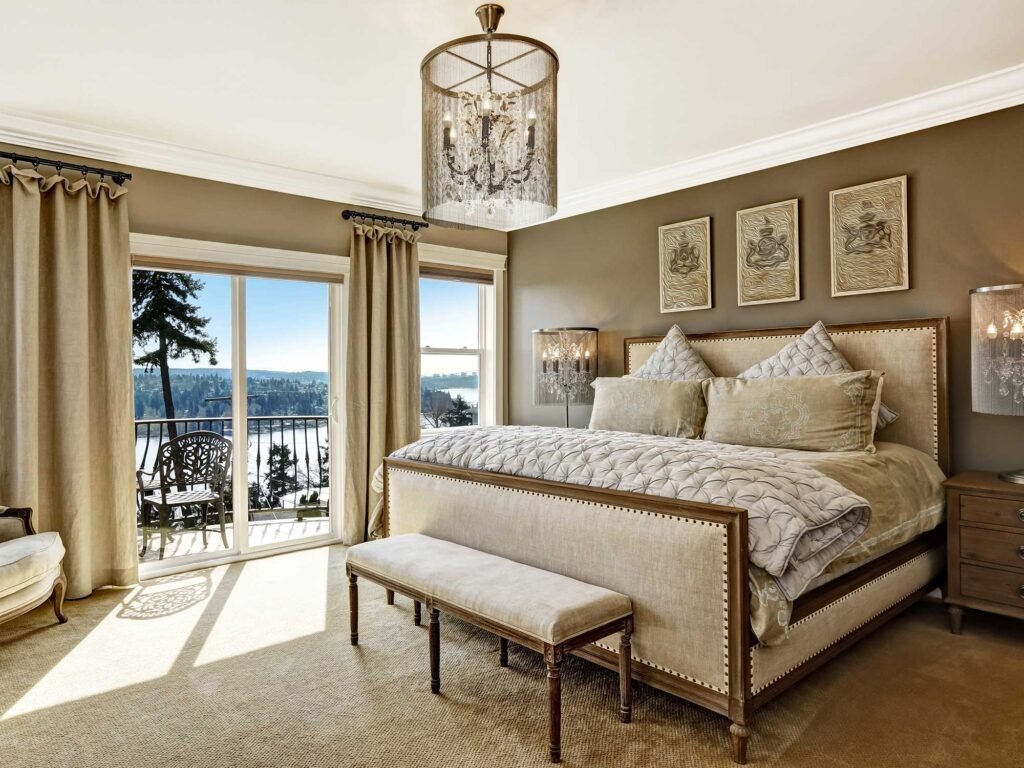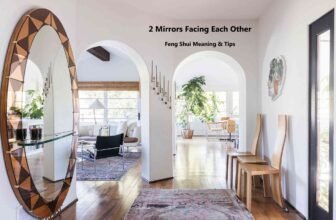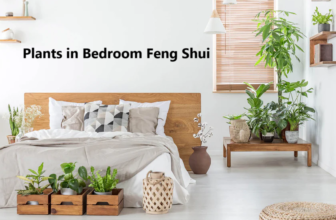What is bad Feng Shui for a house?
Feng Shui, the ancient Chinese art of arranging spaces, focuses on creating harmony and positive energy (Qi) in your home. However, certain design choices and layouts can disrupt this flow, leading to what’s considered bad Feng Shui. If your home feels off-balance or lacks a sense of comfort, it might be time to look at these common bad feng shui house features.

4 Exterior Issues: What Is Bad Feng Shui for a House?
The exterior of your home plays a big role in setting the tone for the energy that flows inside. Certain outdoor factors can disrupt this energy, making it harder to create a peaceful and harmonious living environment. Here’s a closer look at common bad Feng Shui house issues and how they might impact your home.

Facing Sharp Corners, Busy Roads, or Other Harsh Features
Homes positioned at the end of a T-junction or directly facing a sharp corner are said to attract harsh energy, often referred to as “poison arrows” in Feng Shui. This kind of energy can create a feeling of pressure or unease in the home. Similarly, living near a busy road means energy flows too fast and doesn’t have time to settle, leaving the house feeling chaotic.
Other factors, like being under a power line or on a steep hill, can also disrupt energy flow. Power lines are associated with unstable energy, while homes on steep slopes may struggle to “hold onto” positive energy, creating feelings of instability.
What You Can Do:
- Add hedges, trees, or fencing to block harsh energy and create a sense of protection.
- Use landscaping to anchor the home and slow down energy, like placing large rocks or plants near the entrance.
Living Near Cemeteries or Hospitals
Locations tied to grief, illness, or death, such as cemeteries, hospitals, or funeral homes, carry a heavy energy that can weigh on your home. While this doesn’t mean your house is doomed, these environments can influence how the energy around your home feels. You might notice a lack of vibrancy or a sense of emotional heaviness.
What You Can Do:
- Incorporate uplifting elements like colorful flowers, bright lighting, or wind chimes to refresh the energy around your home.
- Use mirrors or reflective surfaces near windows to deflect unwanted energy coming from these places.
Blocked Front Door
The front door is often called the “mouth of Qi” because it’s where energy enters your home. If this area is cluttered or blocked by overgrown plants, shoes, or other obstacles, it can stop energy from flowing in smoothly. A blocked entryway may leave you feeling stuck or like opportunities aren’t coming your way.
What You Can Do:
- Keep the pathway to your front door clear and clean. Regularly trim plants and sweep away debris.
- Use a welcoming doormat or potted plants to draw positive energy to the entrance.
- Ensure the front door opens smoothly and doesn’t squeak or get stuck.
Sloping Land Behind the House
A home with sloping land at the back can symbolize a lack of support, both physically and energetically. This can create feelings of instability or vulnerability for the people living there. Homes on slopes often have energy that “flows away” rather than staying grounded, making it harder to feel secure and balanced.
What You Can Do:
- Add retaining walls or terraces to create a sense of stability.
- Plant tall trees or shrubs behind the house to mimic support and strengthen the energy.
- Use outdoor lighting to brighten the area at night, creating a sense of security and balance.
You may like: Feng Shui House Facing North: Tips
5 Interior Layout Mistakes That Lead to a Bad Feng Shui House
What is bad Feng Shui for a house interior layout? Poor Feng Shui inside the house can lead to feelings of discomfort, restlessness, or instability. Here are five common interior layout mistakes and tips to help fix them.

1. Front and Back Doors in a Straight Line
When your back door is directly visible from the front door, energy enters your home but flows out too quickly, preventing it from circulating and nourishing the space. This creates an unstable environment, often linked to missed opportunities or financial challenges. See Feng Shui House Numbers 2025.
How to Fix It:
- Place a decorative divider, such as a plant or screen, between the two doors to slow down the energy flow.
- Use rugs or furniture to guide energy throughout the home rather than letting it escape straight out.
2. Staircase Facing the Front Door
If your staircase is directly aligned with the front door, energy rushes upward or exits too quickly. This can disrupt the balance of your home and affect areas like health and finances.
How to Fix It:
- Add a small table, artwork, or plant near the front door to redirect energy flow.
- Use soft lighting or a round rug at the base of the stairs to create a welcoming and grounding effect.
3. Bathroom in the Center of the Home
The center of your home represents its heart—a space that should radiate positive energy. Placing a bathroom there can metaphorically and energetically “drain” good energy, impacting health and wealth.
How to Fix It:
- Keep the bathroom clean and clutter-free to minimize energy loss.
- Use earthy tones like beige or light yellow to stabilize energy in this area.
- Always keep the bathroom door closed and the toilet lid down to prevent energy from escaping.
4. Bedroom Above a Garage
Sleeping above a garage can create an unstable foundation because garages are considered hollow, transitional spaces that lack grounding energy. This may lead to poor sleep quality or feelings of unease.
How to Fix It:
- Place a thick rug or carpet in the bedroom to create a sense of grounding.
- Use wooden furniture and earthy colors to stabilize the energy in the room.
- If possible, rearrange the bed so it isn’t directly above the garage door mechanism.
5. Mirrors Facing the Bed
Mirrors reflecting the bed are believed to disturb your energy while you sleep, causing restlessness or even tension in relationships. This is because mirrors “bounce” energy around the room, disrupting the calm atmosphere needed for restful sleep. See how to fix the bad feng shui house layout:

- Move mirrors so they don’t directly face the bed.
- If that’s not possible, cover the mirror with a curtain or fabric at night.
- Opt for smaller mirrors placed in areas that don’t directly reflect the bed.
You may interest: Feng Shui Mirror Facing Front Door 2025: Bad or Beneficial
What Is Bad Feng Shui for a House: 4 Furniture and Room Setup
What is bad Feng Shui for a house room setup? How you arrange your furniture and set up each room has a significant impact on the flow of energy in your home. Poor placement or layout can disrupt harmony, creating unnecessary stress or discomfort. Here are common mistakes to avoid and tips to improve the Feng Shui of your furniture and room setup.
1. Bed Placement
Placing your bed directly in line with the bedroom door is considered poor Feng Shui. Often referred to as the “coffin position,” this alignment can lead to restlessness and feelings of vulnerability, as the energy entering the room flows too strongly toward the bed. See best Feng Shui Bed Placement Direction in 2025.
How to Fix It:
- Position the bed diagonally from the door or against a solid wall.
- Use a sturdy headboard to provide a sense of security and grounding.
- Avoid placing the bed under a window, as this can weaken your sense of stability.
2. Kitchen Stove Next to the Sink or Fridge
The stove symbolizes fire energy, while the sink and fridge represent water energy. Placing these elements too close together creates a clash, leading to tension in relationships or a lack of balance in the home.
How to Fix It:
- If you can’t physically separate them, place a wooden cutting board or a small plant between the stove and sink/fridge. Wood acts as a mediator between fire and water.
- Ensure the kitchen is well-lit and kept clean to promote positive energy flow.
3. Sharp Furniture Edges
Furniture with sharp corners or edges creates “poison arrows” in Feng Shui. These can disrupt the flow of energy and create an atmosphere of tension or discomfort in a room.
How to Fix It:
- Opt for furniture with rounded edges or softer shapes to promote a more soothing environment.
- If replacing furniture isn’t an option, use cushions or decorative fabrics to cover sharp edges.
- Arrange furniture so that sharp corners don’t point directly at seating areas, beds, or pathways.
4. Overcrowded Rooms
Filling a room with too much furniture or decor can block energy flow, making the space feel overwhelming and cramped. It can also limit movement and create stress.
How to Fix It:
- Prioritize function and remove unnecessary furniture or clutter.
- Arrange furniture to create open pathways, ensuring energy can circulate freely.
- Use storage solutions like baskets or shelves to keep the space organized and tidy.
Lighting and Airflow in a Bad Feng Shui House Layout
Lighting and airflow are critical to maintaining good energy in your home. When these elements are off, it can create a sense of imbalance and discomfort.
Dark or Dim Entryways
The entrance to your home is where energy flows in, so it needs to feel bright and welcoming. If your entryway is dim or shadowy, it can block positive energy (Qi) from coming in. Simple changes like adding a brighter light fixture, using mirrors to reflect light, or removing obstacles near the door can make a big difference.
Poorly Lit Rooms
Dark corners or rooms without adequate lighting create stagnant energy. These areas may feel heavy or uninviting. Use floor lamps, wall sconces, or even candles to brighten dark spaces. If possible, open blinds or curtains during the day to let natural light fill the room.
Lack of Fresh Air
When air feels stale or stuffy, energy can’t move freely through your home. Regularly opening windows allows fresh air to circulate, refreshing the space. For homes in areas with poor air quality or during extreme weather, air purifiers or fans can help keep the energy flowing.

Powerful PuroAir HEPA Air Purifiers for Home Large Rooms – Covers 1,115 Sq Ft – Filters Up To 99% of Pollutants, Smoke, Pollen, Dust, and VOCs – Quiet HEPA Air Filter – Air Purifiers for Bedroom B0998FWTHP

LEVOIT Air Purifiers for Home Large Room Up to 1980 Ft² in 1 Hr With Air Quality Monitor, HEPA Sleep Mode, Auto Mode, Smart WiFi, 3-in-1 Filter Captures Pet Allergies, Smoke, Dust, Core 400S-P, White B08R794ZMX

Clorox Air Purifiers for Home, True HEPA Filter, Medium Rooms Up to 1,000 Sq Ft, Removes 99.9% of Mold, Viruses, Wildfire Smoke, Allergens, Pet Allergies, Dust, AUTO Mode, Whisper Quiet B09P1TRMHL

MORENTO Air Purifiers for Home Large Room Up to 1690 ft² with PM 2.5 Air Quality Monitor, Wi-Fi and Alexa compatible, HEPA Auto Mode Double-sided Air Inlet for Smoke and Odor, 23db, MR5866, White B0D5D36CZF
Adding indoor feng shui plants can also improve air quality while enhancing the Feng Shui of your space.

Costa Farms Burgundy Rubber Plant, Live Indoor Ficus Elastica Tree, Live Indoors Houseplant in Décor Planter Pot, Potting Soil Mix, Gift for Housewarming New House, Home or Office Decor, 2-3 Feet Tall B07BC8W8KH

Variegated Spider Plant – Extra-Large – Air-Purifying, Low Maintenance, Thrives in Home & Office – Perfect for Plant Enthusiasts – Live houseplant in Potting Soil – Chlorophytum comosum B0CB7SNZ4P

Costa Farms Peace Lily, Live Indoor Plant with Flowers, Easy to Grow Houseplant in Decorative Pot, Potting Soil, Thinking of You, Get Well Soon Gift, Room Decor, 1 Foot Tall B082PM9MHD

California Tropicals Pothos ‘N Joy – 4″ Live Plant – Variegated White and Green Leaves – Easy to Care for – Perfect for Indoor and Outdoor Home Decor, Office, and Gift – Pot Included B07YXH49J6

Arcadia Garden Products LV25 5-Stem Lucky Bamboo, Live Indoor Plant in Aged Wood Planter for Home, Work, or Gift, Dark ***Cannot Ship to Hawaii** B09CNTDG12

Costa Farms Pothos Live Plants (2-Pack), Easy Care Vining Live Indoor Houseplants, Air Purifier Trailing Plants Potted in Nursery Pots, Potting Soil, Gift for Office and Home Decor, 8-Inches Tall B07G7XLQ9M
Overhead Beams or Ceiling Fans
Ceiling beams or fans directly overhead can create a sense of pressure or discomfort. If you sleep or sit under these, they may contribute to stress or tension. To counter this, rearrange furniture so you’re not directly below them, or use fabric to soften their visual impact.
How to Fix Lighting and Airflow Issues
- Add Layered Lighting: Use a combination of overhead, task, and ambient lighting to create a balanced atmosphere.
- Install Dimmer Switches: Adjust light levels to match the time of day and activities.
- Improve Ventilation: Consider exhaust fans in bathrooms or kitchens to keep air moving.
- Use Natural Scents: Fresh herbs, essential oils, or flowers can keep the air feeling clean and energizing.
2 Color Choices That Disrupt Balance in Feng Shui
Colors are more than just a visual element in your home—they can deeply affect the energy and mood of a space. If you choose the wrong colors, it can create imbalance and discomfort. Here are two color mistakes to avoid:
Overuse of Harsh Colors
While bold colors like red and black can add drama or elegance to a room, overusing them can lead to tension or a heavy atmosphere. Red, for example, is a very active and stimulating color, but if it’s used too much, it can make a space feel stressful or chaotic. Similarly, black can be grounding, but too much of it can make a room feel oppressive or dark.
Fix: Use these colors in moderation. A red accent wall or black throw pillows can work, but balance them with lighter, neutral colors to keep the energy in check.
See Lucky Color for 2025 Feng Shui
Unbalanced Themes
Every room in your house has its own mood, and the colors you choose should complement that. For example, using cold, icy blues and grays in a living room or family area can make the space feel distant or unwelcoming. While these colors may work in a bedroom for a calming atmosphere, they might not be ideal in social areas where warmth and energy are key.
Fix: Stick to warmer, earthy tones for communal spaces like the living room or dining room, and save cooler colors for places where you want a more peaceful vibe, like bedrooms or bathrooms.
Color Fixes for Balance
- Warmth and Balance: In spaces where you want to feel relaxed and comfortable, consider soft, warm tones like beige, peach, or light green. These colors invite harmony and create a welcoming environment.
- Accent Walls: If you want to introduce a bold color, go for an accent wall or smaller details like pillows or rugs, rather than covering the entire room with it.
- Natural Elements: Earthy tones like browns, tans, and greens are always a good choice because they naturally promote balance and grounding energy.
Bonus Tip: See how to enhance relationships, wealth, and positive energy with feng shui bedroom tips based on your zodiac sign.
Pisces ♓ | Aries ♈ | Taurus ♉ | Gemini ♊ | Cancer ♋ | Leo ♌
Clutter and Neglect will Drain Energy in Your House
A cluttered, poorly maintained home blocks energy flow and creates stagnation, which is also called bad feng shui house.
- Cluttered Spaces
Clutter not only makes a house look messy but also traps stale energy, leaving you feeling stuck or overwhelmed. - Broken or Neglected Items
Leaky pipes, broken furniture, or peeling paint symbolize unresolved issues and drain the home’s energy.
How to Fix Bad Feng Shui House
By addressing these common bad Feng Shui house problems, you can create a home that feels more balanced, welcoming, and supportive. Good Feng Shui is about aligning your environment with your well-being, so even small changes can make a big difference.
- Declutter Regularly
Clear out unused items and make sure each space feels open and breathable. - Focus on the Entryway
Keep the front door area clean, bright, and inviting. Add plants or a welcome mat to encourage positive energy. - Balance Elements
Use Feng Shui’s five elements—wood, fire, earth, metal, and water—in balanced proportions throughout your home. - Strategic Mirror Placement
Use mirrors to reflect natural light or beautiful views, but avoid placing them where they reflect beds or doors. - Emphasize Maintenance
Fix leaks, repair broken items, and maintain clean, fresh spaces to support a steady flow of energy.
Final Thoughts: What Is Bad Feng Shui for a House?
Recognizing what is bad Feng Shui for a house is essential for creating a space that promotes peace, comfort, and positive energy. Simple mistakes, like poor furniture arrangement or using harsh colors, can disrupt the flow of Qi and impact your well-being. By making small adjustments, such as improving lighting, ventilation, and clearing clutter, you can significantly enhance the energy in your home.
Feng Shui is about finding balance, and when you address these common issues, your home can become a place of harmony and support. With just a few changes, you’ll be on your way to a more inviting and peaceful living environment.








